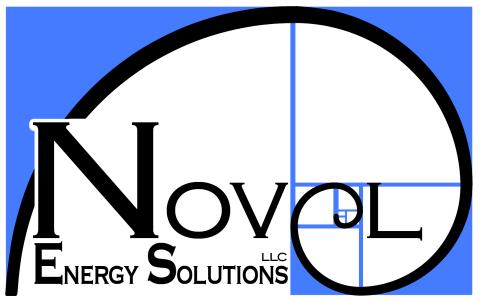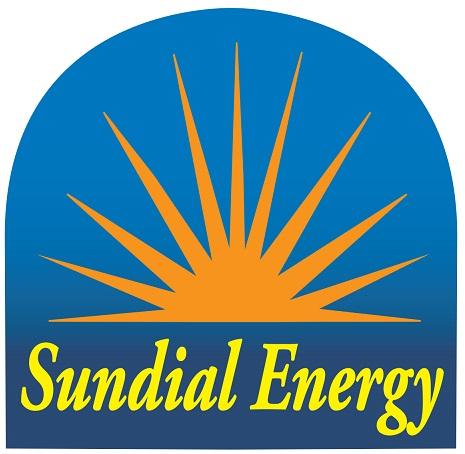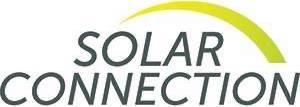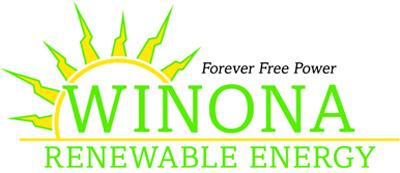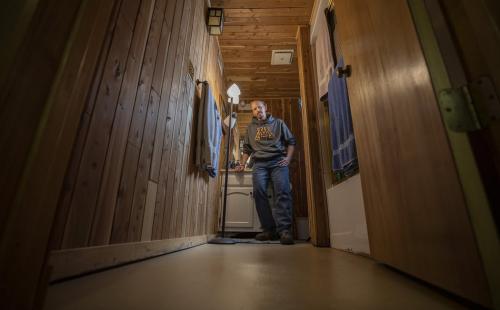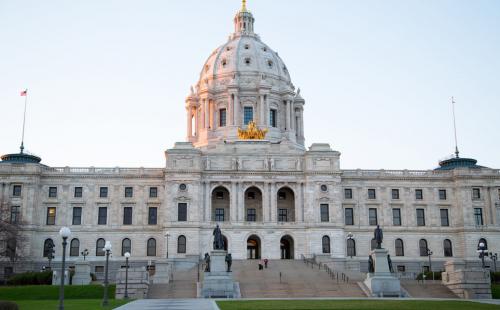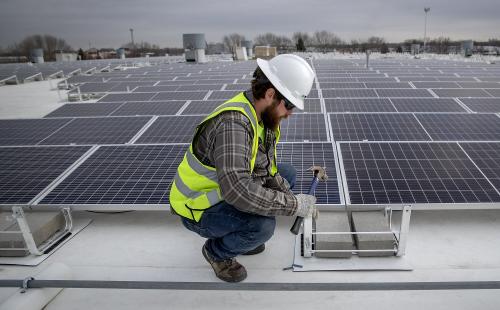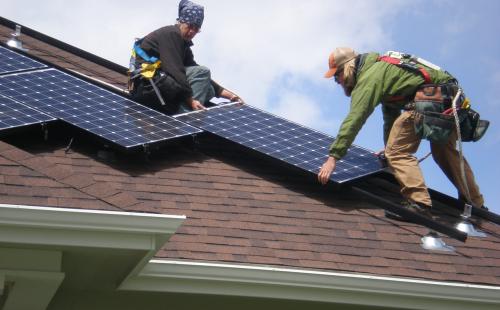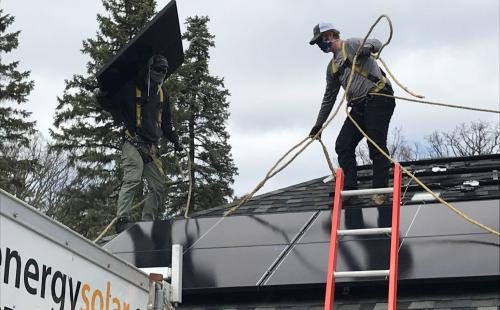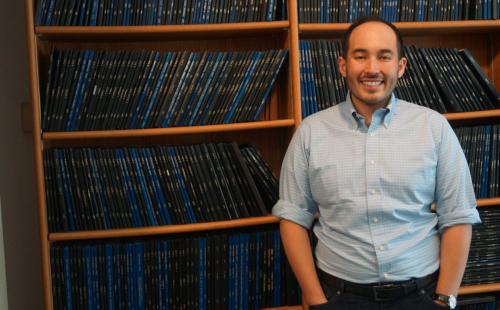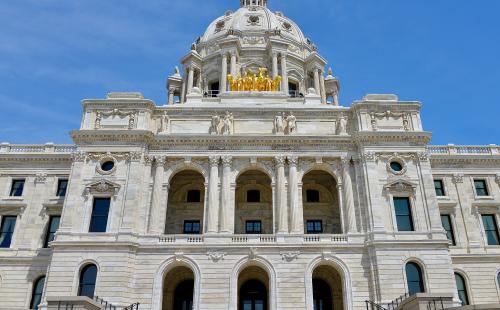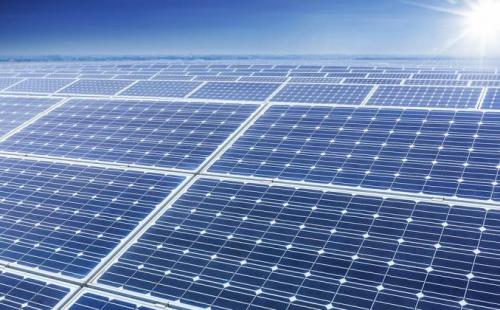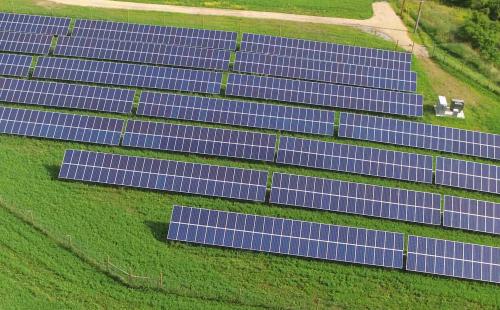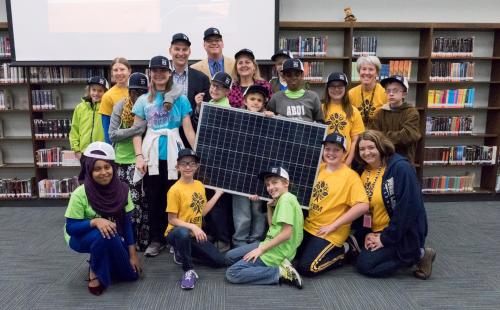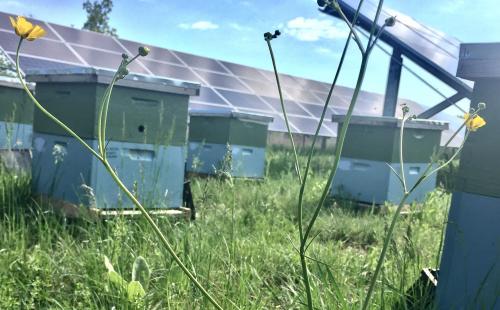Updated: 5/27/2020
The 2020 Legislative Session was a wild ride for MnSEIA, and for everyone at the Capitol. Ultimately, we got a huge win as Solar*Rewards expansion was the featured part of the Renewable Development Account omnibus bill that passed both Chambers in the last hours of Session. This bill was the bigger of two energy-related bills that crossed the finish line in a Legislative Session that was remarkably scaled back due to the COVID-19 pandemic and associated responses.
The bill allocates $15M for the Solar*Rewards program for 2021 and 2022, and includes rollover language that allows for the capture of almost $4M from 2019 and 2020. Because Solar*Rewards rebates typically support one-quarter of a project, this bill will help create nearly $80M in solar projects here in Minnesota.

The bill would not have happened without good use of the groundwork MnSEIA laid in this biennium. Already established relationships with state legislators became incredibly important in a world where face-to-face meetings could not be scheduled. These relationships helped to secure a place for solar in the 2020 legislative environment, despite divided government, otherwise challenging politics, and a global pandemic.
The first month of the 2020 Legislative Session was a very sunny one for MnSEIA. Every issue got or was scheduled for a hearing of some type before the first deadline—and before social distancing went into effect.
As the Legislature ceased in-person meetings, committee process, caucuses, and session, the Legislature announced they would only take up three types of bills: first, COVID-19 related bills to help our healthcare workers keep us healthy; second, priority economic bills, like a bonding bill and other economic stimuli; third, non-controversial bills with bipartisan support and agreement. The legislature had limited bandwidth for debate and an emergency to deal with, and its priorities reflected that reality.
With that political reality shaping MnSEIA’s work for the second half of Session, we had to prioritize and target our work to the bills with the best chance of moving forward.
Extending the Solar*Rewards Program
Our push for Solar*Rewards expansion over the last two sessions found traction in part because bills in both the House (HF1842) and Senate (SF3389) got hearings in the first month of session and because they had been heard in 2019. Ultimately the House and Senate decided that instead of passing stand-alone bills, they would create an RDA omnibus bill. The bill had to be negotiated between the two houses, and ultimately a bill with only four funding provisions was agreed to. The compromise bill included appropriations of $15 million for Solar*Rewards, $46 million for a Prairie Island Net Zero Project, $2 million for economic development grants from the RDA to communities impacted by fossil fuel plant closures, and $2.75 million for repairs to a hydro facility in Granite Falls.
The bill was passed in a bipartisan effort in both houses, and becomes effective July 1, 2020.
Solar on Schools
Solar on Schools is a broadly popular issue that has seen a few bills with different provisions pop up in the last biennium. MnSEIA fought for it to be included in the RDA omnibus bill at the end of Session this year, but given the urgency of COVID-19, solar on schools was not a high enough priority to make the final compromise. We would have been more confident in this bill during a “normal” Session when more public hearings could have mounted a serious push for it. Nonetheless, we were able to advocate for it during the early part of Session, where MnSEIA did organize some very positive public testimony
This bill would have generated $16 million in grants for solar projects on schools throughout Xcel territory. Half of the funds would be used for projects in low-income districts, and all projects would require school districts to include an educational component for students.
As talk of a Special Session over the summer has begun in earnest, rumors from our allies in the Capitol show us that Solar on Schools may have a second bite at the apple this year if a second RDA omnibus bill takes shape.
Community Solar 2.0
Community Solar Gardens (CSG) reform is a largely policy-based set of issues that would require neither General Fund nor RDA money. Due to its complexity and some internal, cross-chamber politics in the Legislature, progress on these issues was best set to move ahead by presenting the Legislature with a deal agreed to by stakeholders.
Discussions with stakeholders moved at a brisk pace in February and early March, but slowed as the pandemic not only affected the normal course of business at the Capitol, but also redirected the priorities of the utility. Ultimately, we did not have enough time during the Session to come to an agreement presentable to legislators.
This final disposition of the CSC reform was disappointing, especially given the leaps in progress that we had made with Xcel’s lobbyists before the pandemic. Given that progress, however, we are confident to have laid some excellent foundation for a Community Solar 2.0 framework at the next opportunity. There are three main components to that framework.
The first is the removal of the contiguous county requirement. A number of benefits will flow from removing the requirement that subscribers to a given CSG reside in the same or contiguous county. First, subscribers will have many more options, so that certain counties are not placed at an arbitrary geographic disadvantage. Second, developers will also have more viable sites available, which will ease pressure on substation space and on host communities. Third, Greater Minnesota will benefit with economic development from gardens built outside the Metro area, and from bringing savings to subscribers across Xcel territory.
The second is Residential Access or Community Access Projects. In an effort to redirect CSG development toward residential subscribers—as many had anticipated in the original 2013 legislation—a few stakeholders and members have worked with MnSEIA to advance a designation for CSGs that meet certain requirements. This type of project would need to meet certain transparency, low-income, and percentage of residential subscriptions criteria in order to gain access to more advantages rates and on-bill repayment.
The third component is a Distributed Generation Tariff (DG) program (which we have also been working toward in other legislative and regulatory pathways) to allow for mid-size solar development connected directly to the distribution grid. While the exact parameters of such a program never quite crystalized in negotiations, the goal is to create a “walk-up” or standard rate between the VOS and the Avoided Cost rate.
MnSEIA and others have toiled over Community Solar 2.0, as a set of ideas, in order to breathe new life into Minnesota’s most expansive solar program. As substation space has begun to dwindle in the most desirable sites adjacent to the Metro, it becomes more clear every construction season that the industry needs more interconnection opportunities. Similarly, stakeholders concerned that community solar could better serve residential renters have faced financeability challenges that need more systemic solutions than one-time grants to serve underserved populations. Finally, DG projects may have the economic capabilities to pay for substation upgrades that would offer new opportunities for CSGs.
Enterprise Sustainability: Solar on Government Buildings
The Office of Enterprise Sustainability requested before Session that MnSEIA work to lift the arbitrary 300 kW cap on solar on government buildings, and if possible, find a relatively modest grant from the RDA to fund projects on the state government enterprise. This bill, like the bill that follows, was scheduled to be heard in the House before the COVID-19 crisis forced the Legislature to close.
Avoided Cost
As discussed above in the context of Community Solar 2.0, MnSEIA has pursued through multiple avenues a way to create larger scale DG installations. Some in the industry have termed this scale “the fourth bucket” after utility scale, CSGs, and rooftop installations. One way to do that would be to remove a statutory impediment to DG—one which ironically was written to advantage renewables by placing them on a different tier than fossil fuels, and now disadvantages them due to their success.
The Avoided Cost bill would remove a requirement that renewable Qualifying Facilities (QF) receive the lowest-cost bid for renewables ever received by the utility with which the QF would interconnect. This policy means that a 5 MW solar QF would receive the same rate as a 200 MW wind project, rather than 1) the annually set Avoided Cost rate that the utility would compensate a fossil fuel facility with, 2) any other rate agreed to by both parties, or 3) a rate determined by the Commission. This superseding rate mechanism was meant to place renewable QFs in a different, more cost-appropriate tier at the time it was written, in the 1990s. Fortunately for the industry more broadly, the costs of solar have come down substantially, but unfortunately, this law—which MnSEIA’s bill would have overturned—places renewables at a disadvantage relative to other QFs, such as a combined-heat-and-power natural gas plant. This bill was scheduled to be heard in the same, cancelled Committee meeting as the bill requested by the Office of Sustainability.
Removing this one statutory clause would open the QF and DG market to competition from solar, and create a very inviting opportunity for Minnesota’s solar industry. It remains a MnSEIA priority in the Sessions to come.
Consumer Protections
By requiring solar installers to hold a Residential Contractors License, this bill would have allowed solar customers that got a judgment against bankrupt installers (for example, as victims of fraud) to have access to a fund managed by the state and paid into by licensure fees. The bill was a specific response to fraud perpetrated on solar customers by two out-of-state bad actors in the last several years.
The Consumer Protections bill, which would require all solar installers to hold a Residential Building Contractors License, had an informational hearing in the House Labor Committee early in Session, but it was unclear whether the bill would be slated for a formal hearing as face-to-face meetings and committee hearings were put off for the remainder of the biennium.
MnSEIA faced significant opposition from other trade groups on this issue. For that reason, this bill did not fall into any category of bills that were a Legislative priority for the social-distanced portion of Session. Nonetheless, the informational hearing brought more sunlight to the issue, and demonstrated to the public the good faith of Minnesota’s solar industry, which was asking the state to be regulated for the public good.
The rare chance a given bill becomes law in a “normal” Session—magnified by the extraordinary circumstances of 2020—demonstrate the value MnSEIA has brought to the industry in having the success we did this year. That success results from continuously Moving Solar Forward year after year, Session after Session, which builds momentum upon momentum.
Thank you to our legislative prospectus donors
Thank you to all our members who helped financially support us during this year's legislative session. If you would be interested in donating to our legislative prospectus next year, please email info@mnseia.org
Recent MnSEIA featured articles:
Articles that MnSEIA's David Shaffer has been featured in this session:
To see more of MnSEIA in the news, click here.

